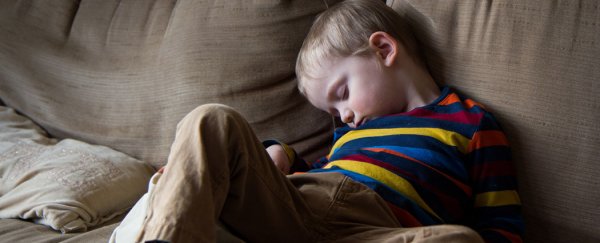Short-sightedness could be eradicated in children through the use of night-time contact lenses that promote the formation of healthy eye shapes while they sleep, a new study has shown.
The reshaping process, known as orthokeratology, involves the use of soft contact lenses that correct abnormalities in eye shape that can result in short-sightedness (aka myopia).
The research involved a three-year trial of more than 300 children in Britain and elsewhere and produced some remarkable results: according to Sarah Knapton of The Telegraph, none of the participants who wore the soft lenses at night over the course of the trial experienced any detrimental changes in their vision.
Kids based in control groups, however, who didn't receive the orthokeratology treatment, weren't so lucky, with some suffering a rapid deterioration in vision over the three-year period.
The new research follows a recent study from Ulster University in the UK that found myopia has become a significantly worse problem in Britain over the last half-century, with short-sightedness in children doubling over the past 50 years.
That research found 23 percent of British children aged 12 to 13 suffered from myopia, whereas data from the 1960s showed only one in 10 British kids experienced the problem. It has been suggested that the decline in children's eye health is related to the amount of time spent outdoors, with today's kids spending too much time indoors.
Previous Chinese studies involving 'glass box' school rooms - where lessons were effectively conducted outdoors, with students seated within clear, translucent classrooms - have found myopia in children can be reduced by as much as 23 percent. But the new orthokeratology research, presented at the British Contract Lens Association's annual conference, may hold the key to eliminating short-sightedness without requiring such significant changes in daily behaviour.
"Parents who are worried about myopic progression in their children now have a viable option," said Pauline Chom, a professor with the Hong Kong Polytechnic University, which was involved with the research. "Orthokeratology has been shown to effectively slow the progression of myopia in children."
The insitutions's previous research found orthokeratology could slow down myopic progression in school children by approximately 60 percent.
Others in the optometry industry are cautiously optimistic about the new findings but are calling for further testing to be carried out before pronouncing any kind of miracle cure for myopia.
According to specialist Gordon Ilett from the UK's Association of Optometrists, "It is emerging technology and there is lots of anecdotal evidence about how brilliant it is, but really we need large population studies to prove efficacy."
